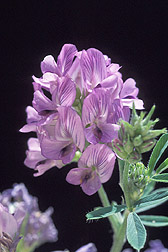This page has been archived and is being provided for reference purposes only. The page is no longer being updated, and therefore, links on the page may be invalid.
|
Read the magazine story to find out more. |
Alfalfa as a Fuel--and a Plastic?By Don ComisJuly 16, 2002 U.S. Department of Agriculture bioenergy funds are being used to convert alfalfa into the first dual-use biofuel plant. The leaf serves as a factory for raw, biodegradable plastic beads, other industrial products or better livestock feed, while the stem goes to ethanol production. JoAnn Lamb, a plant breeder who serves on a team of five scientists at the Agricultural Research Service's Plant Science Research Unit in St. Paul, Minn., has created the "parents" for new alfalfa varieties by crossing European varieties with unusually thick stems with modern alfalfa varieties developed for dairy feed. The thick stems provide more raw material for ethanol production. Team member Deborah Samac, an ARS plant pathologist, has transformed alfalfa so it can manufacture plastic. The process isn't practical yet, but it could be, if a cell wall barrier could be prevented from trapping beads of plastic. With the USDA funding, ARS animal scientist Hans Jung will develop tests to screen alfalfa plants to find those with the most sugar and starch in their stems and the most digestible fiber. These types of stems would provide more material for conversion to ethanol by fermentation microbes. ARS will also use the funding to hire a biochemist/geneticist to find genes that further improve the stems' conversion to ethanol. Besides plastics and fuel, alfalfa may be a renewable resource for replacing other petroleum-based products and nonrenewable resources, such as nitrogen and phosphorus fertilizers. Carroll Vance, team member and unit research leader, has isolated many genes for creating new varieties, including one that helps alfalfa fix more nitrogen from the air and take in more phosphorus. Because alfalfa absorbs nitrogen from deep in the soil, ARS soil scientist Michael Russelle sees a major role for alfalfa in preventing fertilizer from polluting water. More information on this alfalfa research can be found in the July 2002 issue of Agricultural Research magazine. ARS is USDA's chief scientific research agency. |

